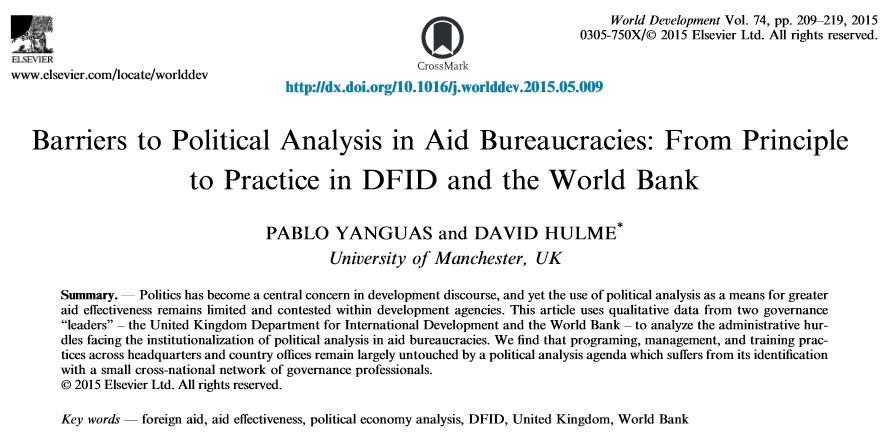A few months ago I wrote about Samuel Finer’s contribution to our understanding of government. Well, there was a point to it: on November 3rd the University of Manchester is honouring him with a conference on the “Development of Government”, through which we aim to discuss Finer’s lasting relevance for current debates on government retrenchment here in the North, public sector reform in the South, and the role of governance indicators in the new SDG global agenda. I will be a presenter on the PSR panel, flanked by far more eminent people than myself, and the programme promises to deliver an engaging day of actual conversation (how un-academic!). Sign up here if you are interested in attending, and keep an eye on the Effective States blog for further information about Samuel Finer and the conference.
Category: Development
El 15 de septiembre fui invitado a la Agencia Española de Cooperación Internacional al Desarrollo (AECID) para dar una charla sobre nuevas ideas y debates emergentes sobre eficacia de la ayuda en el mundo anglosajón en torno a Thinking and Working Politically, Doing Development Differently o Results-Based Approaches. A pesar de la densidad de contenidos y la miríada de acrónimos, la presentación despertó un debate bastante animado, y con suerte habrá plantado semillas que piquen la curiosidad de algnos de nuestros expertos. Para quien esté interesado en lo último en innovación y los desafíos de gestionar el cambio, comparto aquí el powerpoint de la presentación.
New publication!
Upcoming article with Badru Bukenya in Third World Quarterly. Stay tuned…

Why is researching donors so hard?
I have just finished supervising a master’s thesis at the University of Manchester which compares the extent of internal reforms in DFID and the Spanish Development Co-operation Agency, AECID. The student – an AECID civil servant – wanted to know why her organization failed so miserably to reform internally in accordance with its international commitments to principles of aid effectiveness, in particular when one could find in the European vicinity other agencies like DFID that did so much better on all indicators. What emerges is a story of politics and institutional infighting: a socialist prime minister who symbolically boosted the foreign aid budget through the roof without actually planning how it would be managed, a tenuous balance of institutional power where only a few key individuals tried to make a semi-autonomous agency work, and a cadre of jaded civil servants headed by political appointees for whom development co-operation was often a stepping stone in their political careers. This is as much as I can spoil right now; for the whole picture you will have to wait a while.
Revuelo en 3500 Millones
Esta semana ha aparecido en 3500 Millones un post mío que parece haber causado un poco de revuelo en la comunidad de cooperación al desarrollo en España. El argumento original era sobre especialistas vs generalistas; pero inevitablemente una de las interpretaciones ha sido funcionarios vs profesionales (un campo de minas en el que ya me adentraré más adelante). Entre las respuestas más ofendidas se cuenta una persona que decidió que mi idea era que solamente se trabajase en cooperación si se tiene un doctorado: se nota que no conoce a muchos académicos, que apenas pueden hacer funcionar sus propios departamentos! Y tampoco sabe lo cómodo que se está analizando desde fuera, en lugar de tener que lograr resultados en el mundo real. En fin: debate generado, misión cumplida.
Respecto al modelo británico como panacea… Tampoco hay que glorificar a nadie. Aunque por un lado acaban de aprobar una ley para cumplir el 0,7% en cooperación, y por otro son capaces de reírse de sí mismos así:
[Originally posted on the ESID blog.]
These days I am reading psychologist Daniel Kahneman‘s book Thinking, Fast and Slow (2012), in which he outlines two aspects of our brains which determine how we process information, associate ideas and solve problems. Kahneman speaks of two systems: System 1, which is quick, intuitive, and effortless; andSystem 2, which is slow, analytical, and costly.
The first chunk of the book is devoted to the interaction between these two systems, and in particular how System 1 is prone to bias by jumping to unwarranted conclusions on the basis of what’s familiar or sounds right, even without us consciously realising what we are doing; System 2 can then jump in to check our intuitions against facts and avoid logical mistakes, but doing so requires willpower and freedom from disruptive stimuli (we all have a limited budget for effort, be it mental, emotional or physical).
As I read the book, I started wondering whether the proponents of political analysis in aid agencies could learn something from the interaction between these two systems in our brains.
